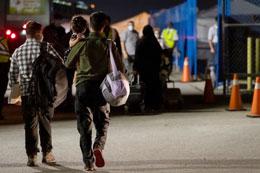‘Stop blaming COVID for visa processing delays’

By Mata Press Service
A coalition of lawyers is calling on Immigration Canada to stop using the COVID-19 pandemic as an excuse for the growing visa backlog that is blocking over a million people from starting their new lives in Canada.
Over 1.3 million immigration applications in the system have taken longer to process than the government’s service standards dictate. That amounts to about 54 percent of all the pending applications in the system.
Among them are international students, foreign workers, spouses and family members waiting to reunite with their kin already in Canada and refugees.
In a letter to Immigration Minister Sean Fraser, four immigration lawyer associations highlighted their deep concerns about the significant delays in scheduling eligibility interviews and issuing documents and work permits for refugees.
The letter was signed by the Canadian Immigration Lawyers Association (CILA), the Canadian Association of Refugee Lawyers (CARL), the Refugee Lawyers Association of Ontario (RLA), and the Quebec Immigration Lawyers Association (AQAADI).
“Federal Court decisions have started to demand more of government officials than blanket statements that the pandemic has caused delays and backlogs. Canada’s immigration system was chronically understaffed long before the pandemic began. This is therefore not a new issue. The COVID-19 pandemic cannot serve as an excuse for slower processing times indefinitely,” the groups said in the letter.
In particular, their letter focussed on the plight of refugee applicants that are in limbo worldwide and in Canada.
Administrative delays in issuing identity documents and work permits to refugee claimants are not in keeping with their statutory right to such documentation, they said.
“The lack of Refugee Protection Claimant Documents (RPCD) can prevent a refugee claimant from completing such basic tasks as opening a bank account or renting an apartment.
“Likewise, excessive delays in issuing work permits to refugee claimants results in reliance on social assistance, delayed integration, prejudice in professional and educational development, delayed familial reunification with their family members abroad, and psychological harm,” the letter stated.
The Minister must prioritize and rectify this situation on an urgent basis so that refugee claimants’ well-recognized rights to identity documents and the ability to work are respected and upheld, the coalition said.
It said there are various solutions to addressing the ongoing delays in the issuance of identity documents and work permits to refugee claimants, including:
• Hiring staff and ensuring effective training to meet particular eligibility interview targets;
• Offering virtual eligibility interviews and combining the steps for an eligibility interview;
• Facilitating effective claimant and counsel communication with IRCC and CBSA;
• Providing standard wait times for eligibility interviews across the country;
• Issuing RPCDs and work permits directly to refugee claimants at eligibility interviews, when this is practicable;
• Issuing RPCDs and work permits electronically, rather than mailing printed work permits to refugee claimants or their counsel, in order to avoid delays and the loss of work permits; and,
• Issuing a work permit or interim authorization to work automatically with the acknowledgment of claim.
The group said the minister must prioritize and rectify this situation on an urgent basis so that refugee claimants’ well-recognized rights to identity documents and the ability to work are respected and upheld.
“We request that the Minister address the excessive delays in scheduling eligibility interviews and processing RPCDs and work permits on an urgent basis.”
Refugees in Canada
• Canada has welcomed 1,088,015 refugees since 1980. This number includes those who were recognized as refugees in Canada or who were resettled from overseas.
• Refugees who arrived as adults earn on average $20,000 in employment income in their first year. While this is less than half the Canadian average, their annual earnings climb steadily.
• Half of refugees (51%) working are employed in high-skilled jobs, which include doctors, dentists, architects, service managers and software engineers. In 2016, 33% of refugees worked in jobs that required high school and/or job-specific training (e.g. truck drivers, food and beverage servers, industrial butchers). About one-fifth of refugees were employed in professional jobs that required a university degree (e.g. doctors, dentists, architects).
• Refugees create jobs for both themselves and other Canadians. Including those who are self-employed and those who own companies, 14.4% of refugees in Canada between 10 and 30 years are entrepreneurs, compared to 12.3% of people born in Canada. Refugees use their diverse skill sets and talents to start businesses and create jobs for themselves and other Canadians.
• Canada has an aging population, with the average age increasing from 37.7 in 2001 to 41.0 in 2016. Refugees are on average 11.1 years younger than those born in Canada, which means they are more likely to be of working age. The average age of a refugee who came to Canada in 2016 was 28.9 years old. Refugees often come to Canada early in their lives, with many years to contribute.
• Refugees have resettled in every part of Canada – as far north as Whitehorse, Yukon; as far east as St. John’s, Newfoundland; and as far west as Prince Rupert, British Columbia. Recent census data show that newcomers, led by refugees, are more likely to move to other parts of the country. Of refugees who arrived between 2011 and 2016, 48% live in smaller cities and towns, compared to 44% of all immigrants.
• Home ownership is an indicator of a household’s financial health, as well as a family’s commitment to a community. Despite their initial lack of financial resources, 65 percent of refugee families who have been in Canada for 10 years or more live in homes they own, compared with 79 percent of Canadian-born citizens. About one-third of refugee families managed to buy their own homes within their first five years in the country. – Source UNHCR









